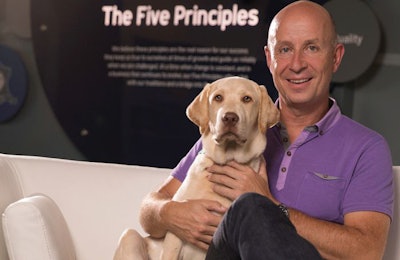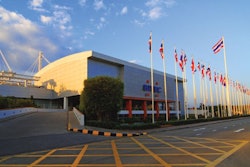
In the lobby of Mars Petcare North America’s headquarters in Franklin, Tennessee, USA, sizable letters proclaim the company’s purpose: “Make the world a better place for pets.” For the largest pet food company in the world, that mission represents more than just words on a wall. It manifests in nearly every aspect of the business and in every Mars associate’s daily activities.
“That’s our ‘why,’ and it’s sourced out of an insight, which was, we recognize pets make our world better,” explained Mark Johnson, regional president of Pet Nutrition North America, Mars Petcare. “However you look at it, whether it be stress relief, whether it’s living healthier lifestyles, pets add a huge value to us as humans. So our role in life is to make their world better. We can do that through the foods we provide, through delivering great nutrition, great enjoyment; we can do that through services.”
Making that purpose come alive for associates has been a focus for Johnson. Another emphasis: keeping the business in touch with the market and consumers. That, along with an ongoing commitment to quality and food safety, keep Mars Petcare growing and in the lead.
Staying connected to consumers, customers
A 30-year veteran of Mars Inc. (with all but two of those years spent in pet care), Johnson has been president of the North American pet nutrition business since fall 2015. During his time in charge, he has overseen the integration of the P&G pet food brands that Mars acquired, while also pushing a consumer- and customer (retailer)-centric focus throughout the organization. “I’m very passionate that, in order to stay successful, you need to be very close and connected to consumers and their ever-evolving needs and wants. And to your customers, who are also evolving and changing very fast.”
That means sharing consumer research insights with associates and making customer feedback, such as satisfaction surveys, very visible throughout the company. Besides spending significantly on in-home research, the company is also increasingly investing in research on how consumers shop, including via a unique in-store research facility near the company’s headquarters.
“This is not the only thing we do, but we have a facility where we’re able to physically represent a Walmart, a PetSmart, a Petco,” Johnson said. “You can literally open a door and walk into a Dollar General or an independent pet store. And there we are able to partner with our customers on understanding how consumers want to buy their products, the kind of new products they want to see, how they want to see them merchandised.”
Johnson explained that Mars also conducts traditional ethnographic consumer research as well as research around the insights generated. For example, an insight revealed that cat owners were portioning 3.5-ounce cans of the company’s Sheba wet food. “They typically were opening it up, feeding a portion, then putting the second portion in the refrigerator. The second time it came out for feeding, the cat wouldn’t eat it, because the cat wants its food closer to body temperature,” he said. “So we developed a proposition called Perfect Portions for Sheba – which we’re now rolling into a whole raft of brands – which gives them the perfect feeding size. That’s been incredibly successful. We launched it in 2015, and demand has been overwhelming.”
Mars’ unique role in pet food
Johnson credited this ongoing investment in research to Mars being a unique company. “If you look at the pet food industry, you’ve got big corporations and you’ve got small, founder-based businesses. And I think both are fantastic,” he said. “The interesting thing about Mars is it’s a big company, but we’re a private company. We’re not quite like other big corporations who are publicly traded, with specific agendas. And I think that enables us to operate differently, in that we can work for the long term, not just the short term. We can invest more in ensuring we’re in touch with consumers and customers, and we’re investing in facilities.”
Those facilities include the US$110 million Innovation Center near the current headquarters (see sidebar), plus a new headquarters slated to open in 2019.
“Being a private business is important. We’re successful on multiple fronts, not just the financial front. We have a bigger purpose than just the financials,” Johnson said. That includes a commitment to sustainability – its North American sites now send zero waste to landfills and are working to have zero impact on the environment overall in a generation – its guiding principles and, again, its purpose. Every Mars associate receives 16 paid hours a year to volunteer, usually at pet- or shelter-related events.
Johnson also cited Mars’ Better Cities for Pets program. “We’re able to do a lot of leading-edge work to try and understand how we can create better environments for pets to live in the US. As a sizable player, we feel a responsibility toward that.”
Growth opportunities, but watch out for quality, safety
Johnson sees a mix of opportunities and responsibilities for the pet food industry overall. “I think our ‘watch out’ is the quality and food safety point. What’s really important is that, as an industry, we have the right level of controls, the right level of governance around the quality of products that are produced, because that is critical,” he explained. “Pets are extensions of people’s families, no different from a child, and we need to be operating in that way.”
On the positive side, pet food is growing, built on trends that will continue to support that growth. “You see a lot of passion in the industry. A lot of people are trying to come up with new and better propositions to meet consumer needs,” Johnson said. “We work in a great industry. Sometimes you have to pinch yourself and say, we’re very lucky.”
More insights from Mars Petcare president
www.PetfoodIndustry.com/articles/6658
Just the facts
Headquarters: Franklin, Tennessee, USA (North American Pet Nutrition headquarters); Brussels, Belgium (global headquarters)
Facilities: More than 20 manufacturing locations across the US
Officers: Mark Johnson, Regional President of Pet Nutrition North America, Mars Petcare
Sales: Mars Petcare is growing and gaining share in the market
Brands: US brands include Pedigree, Iams, Royal Canin, Greenies, Dentastix, Temptations, Nutro, Cesar, Crave, Sheba and Eukanuba; veterinary practices include Banfield, Blue Pearl and Pet Partners; specialty products include Wisdom Panel Canine DNA Tests and Whistle Location and GPS Tracker
Distribution: Nationwide food, drug and mass, and pet specialty retailers, and online retailers
Employees: More than 26,000 associates across the US Petcare businesses (more than 45,000 associates globally)
Website/social media: www.mars.com/petcare; www.bettercitiesforpets.com; @MarsPetcareUS on Facebook, Instagram, LinkedIn and Twitter
State-of-the-art pet food R&D at Mars’ Innovation Center
Much of Mars Petcare North America’s product development research takes place at its state-of-the-art, gold LEED-certified Innovation Center in Thompson’s Station, Tennessee, USA, near the company’s headquarters. Supporting 22 North American sites, the facility opened in fall 2014 and includes:
- A Pet Feeding Center with about 230 cats and dogs, many adopted from local shelters. After several months serving as palatability, digestibility and stool quality testers, each pet is carefully “rehomed” with a Mars associate, friend or family member.
- A Quality and Innovation Center housing product development support staff and activities, and serving as one of five regional labs globally while supporting quality, safety and product testing at the company’s North American plants.
- A product development center with dry, wet, and treat production lines that allow Mars Petcare to create new innovations without interrupting regular production lines in its manufacturing sites. It also serves as a source of technical expertise for the manufacturing network to test new or more efficient methods of production.
- A Discovery and Learning Center, which hosts human sensory panels, serves as an education space for customers and vendors, and a gathering hub for company associates.
The Innovation Center campus currently spans 30 acres and houses nearly 200 associates. The walls of all the buildings are decorated with oversized photos of associates’ pets.
















